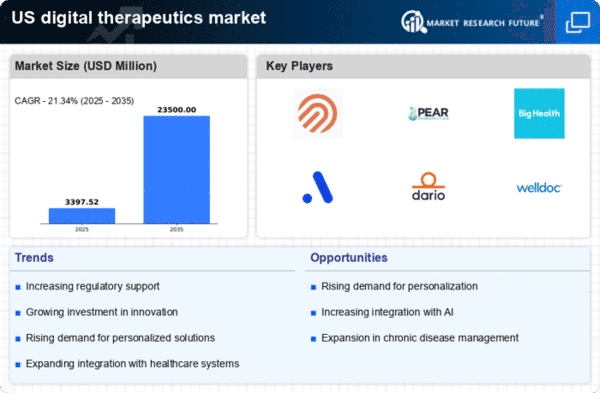Growing Focus on Preventive Healthcare
The digital therapeutics market is witnessing a growing emphasis on preventive healthcare strategies. As healthcare costs continue to escalate, there is a concerted effort to shift from reactive to proactive health management. Digital therapeutics provide tools that empower individuals to take charge of their health, potentially reducing the incidence of chronic diseases. In the US, preventive healthcare initiatives are gaining traction, with a reported increase in the use of digital solutions for lifestyle modifications. This shift is expected to drive the digital therapeutics market, as more individuals seek out interventions that promote wellness and prevent disease onset. The potential for cost savings and improved public health outcomes further underscores the importance of this trend in shaping the future of healthcare.
Technological Advancements in Healthcare
Technological advancements are playing a pivotal role in shaping the digital therapeutics market. Innovations in artificial intelligence, machine learning, and data analytics are enabling the development of more sophisticated therapeutic solutions. These technologies facilitate personalized treatment plans that adapt to individual patient needs, thereby enhancing engagement and efficacy. In the US, the integration of advanced technologies is projected to increase the market's value significantly, with estimates suggesting a growth rate of over 25% annually. Furthermore, the ability to collect and analyze real-time data allows for continuous monitoring and timely interventions, which are crucial for effective treatment. As healthcare providers increasingly adopt these technologies, the digital therapeutics market is likely to expand, offering new opportunities for both patients and providers.
Rising Demand for Chronic Disease Management
The digital therapeutics market is experiencing a notable surge in demand for solutions aimed at chronic disease management. As the prevalence of chronic conditions such as diabetes and hypertension continues to rise, healthcare providers are increasingly seeking innovative ways to support patient care. In the US, approximately 60% of adults live with at least one chronic disease, which underscores the necessity for effective management tools. Digital therapeutics offer personalized interventions that can enhance patient adherence and improve health outcomes. This trend is likely to drive investment in digital health technologies, as stakeholders recognize the potential for cost savings and improved quality of life for patients. Consequently, the digital therapeutics market is poised for substantial growth as it aligns with the evolving needs of healthcare systems and patients alike.
Regulatory Support and Reimbursement Policies
Regulatory support and favorable reimbursement policies are emerging as critical drivers for the digital therapeutics market. The US government and regulatory bodies are increasingly recognizing the importance of digital health solutions, leading to the establishment of frameworks that facilitate their integration into standard care. Recent initiatives have aimed to streamline the approval process for digital therapeutics, making it easier for developers to bring their products to market. Additionally, reimbursement policies are evolving to include digital therapeutics, which enhances their accessibility and adoption among healthcare providers. This supportive regulatory environment is likely to bolster the digital therapeutics market, as it encourages innovation and ensures that patients can benefit from these advanced solutions.
Increased Investment from Healthcare Stakeholders
Investment in the digital therapeutics market is on the rise, driven by a growing recognition of the value these solutions bring to healthcare. Venture capital funding and partnerships between technology firms and healthcare providers are becoming more prevalent, as stakeholders seek to capitalize on the potential of digital therapeutics. In the US, funding for digital health startups has reached unprecedented levels, with estimates indicating an influx of over $10 billion in recent years. This financial backing is likely to accelerate innovation and the development of new therapeutic solutions, thereby expanding the market. As healthcare stakeholders continue to invest in digital therapeutics, the industry is expected to evolve rapidly, offering a wider array of solutions to meet diverse patient needs.
















